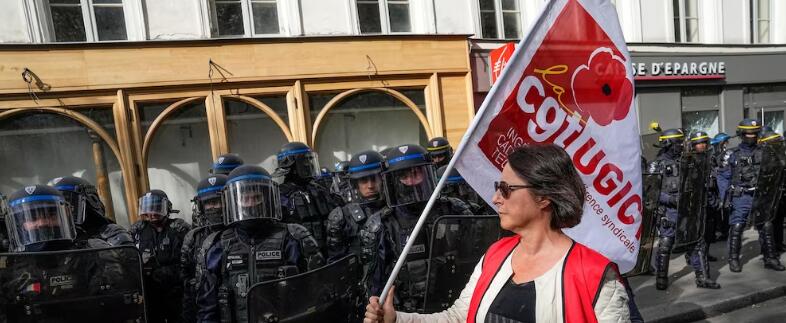French activists protest racism and police brutality while officers are on guard for key events
Families, community groups and far-left activists marched in cities around France on Saturday to decry racism and police brutality, putting authorities on edge at a time when French police are deployed en masse for a string of high-security events.
Lingering anger over the killing by police of 17-year-old Nahel Merzouk in June was an impetus for Saturday’s protests, but they included groups with disparate demands for immigrants’ rights, affordable housing and economic justice. More than 100 marches were planned around France, and Interior Minister Gerald Darmanin ordered special police vigilance.
Tensions briefly flared at the largely peaceful, boisterous protest in Paris. Members of the crowd smashed windows of a bank along the march route, and police evacuated the rattled employees. At another spot, protesters surrounded a police car and an officer darted out, waving his gun.
Some 30,000 police and gendarmes were working Saturday to keep order for a visit by Pope Francis to Marseille and at three Rugby World Cup matches, according to the interior minister’s office. The security presence was also reinforced for the three-day visit of Britain’s King Charles and Queen Camilla, which wrapped up Friday evening.
The protesters’ demands include tougher rules limiting the use of firearms by police; an independent body to replace the internal agency tasked with investigating police abuses; and massive state investment in low-income neighborhoods.
Marchers lamented what they feel has been a failure to address problems exposed by the killing of Merzouk, a French-born youth of north African descent, in the Paris suburb of Nanterre. He was stopped by two officers who subsequently alleged that he’d been driving dangerously, and died from a shot through his left arm and chest. The officer who fired the shot was given a preliminary charge of voluntary homicide.
Merzouk’s death unleashed violent protests in Nanterre that spread and morphed into nationwide riots. Mass police deployment quelled the mayhem, but tensions linger.
“The police kill in France. That is not new. But we have the impression that the middle classes and others outside the low-income neighborhoods are gaining awareness of repression by the state,’’ said Belkacem Amirat, who came from the Paris suburb of Antony to march in the capital.
Law student Justine Larnac said “the system of police needs to be fundamentally reformed,” notably to curb police violence during arrests and traffic stops and address racial profiling.
The French government denies systemic racism or brutality by police. Paris police chief Laurent Nunez defended officers, saying Saturday on broadcaster France-Info that they sometimes need to use “legitimate, legal and proportional violence” to stop ‘’dangerous behavior, vandalism and looting.’’
For Saturday’s march in Paris, 1,000 officers were deployed to keep order.
In Marseille, about 5,000 police officers and 1,000 private security officers were in place for the pope’s visit, as well as dozens of surveillance cameras along Francis’ route. President Emmanuel Macron, after meeting with the pope Saturday, shook hands with onlookers and police guarding the venue.
Security measures have also been heightened in the nine cities hosting the Rugby World Cup, running from Sept. 8-Oct. 28.
Organizers of Saturday’s protests include the far-left party France Unbowed and hard-left union CGT, among Macron’s loudest critics. Climate activists, a farmers’ collective and community groups that work to combat racism and police abuse also took part.
